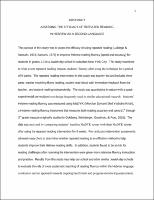Please use this identifier to cite or link to this item:
https://hdl.handle.net/20.500.12202/6819| Title: | Assessing the efficacy of repeated reading in Hebrew as a second language. |
| Authors: | Goldberg, Scott J. Sokolow, Moshe Turetsky, Ilana Curi-Hoory, Ilanit |
| Keywords: | Hebrew as a second language repeated reading intervention reading fluency MaDYK (Mivchan Dynami Shel Yecholot Kriah) fluency instruction foreign language instruction foreign language acquisition educational leadership |
| Issue Date: | May-2021 |
| Citation: | Hoory, Ilanit. (2021, May). Assessing the efficacy of repeated reading in Hebrew as a second language. (Publication No. 28542878) [Doctoral dissertation, Yeshiva University]. PQDT |
| Abstract: | The purpose of this study was to assess the efficacy of using repeated reading (LaBerge & Samuels, 1974; Samuels, 1979) to improve Hebrew reading fluency (speed and accuracy) for students in grades 1-3 in a Jewish day school in suburban New York City. This study examined to what extent repeated reading impacts students’ fluency after using the technique for a period of 6 weeks. The repeated reading intervention in this study was teacher-led and includes three parts: teacher modeling fluent reading, student read-aloud with immediate feedback from the teacher, and student reading independently. The study was quantitative in nature with a quasiexperimental pre-test/post-test design frequently used in similar educational research. Students’ Hebrew reading fluency was measured using MaDYK (Mivchan Dynami Shel Yecholot Kriah), a Hebrew reading fluency instrument that measures both reading accuracy and speed (1st through 3rd grade measure originally studied in Goldberg, Weinberger, Goodman, & Ross, 2010). The data was analyzed by comparing students’ baseline MaDYK scores with their MaDYK scores after using the repeated reading intervention for 6 weeks. Pre- and post-intervention assessments allowed researchers to determine whether repeated reading is an effective method to help students improve their Hebrew reading skills. In addition, students found to be at risk for reading challenges after receiving the intervention were given more intensive fluency instruction and practice. Results from this study may help our school and other similar Jewish day schools to evaluate the role of more systematic teaching of reading fluency within the Hebrew language curriculum and an approach towards ongoing benchmark and progress-monitoring assessments. |
| Description: | Doctoral dissertation, EdD / Open Access |
| URI: | https://hdl.handle.net/20.500.12202/6819 https://ezproxy.yu.edu/login?url=https://www.proquest.com/dissertations-theses/assessing-efficacy-repeated-reading-hebrew-as/docview/2544498232/se-2?accountid=15178 |
| Appears in Collections: | Azrieli Graduate School of Jewish Education & Administration: Doctoral Dissertations |
Files in This Item:
| File | Description | Size | Format | |
|---|---|---|---|---|
| I. Curi-Hoory Final Dissertation May 2021 updated OA.pdf | 967.41 kB | Adobe PDF |  View/Open |
This item is licensed under a Creative Commons License

